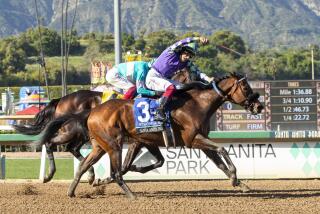Russian’s Roulette : Jockey Leaves Family and Homeland for Opportunities on Southland Tracks
Arriving along the backstretch at Fairplex Park in Pomona for an interview, the jockey from Russia, Gennadi Dorochenko, was wearing a blue denim jacket that had “U.S. Army” stitched on the left breast pocket.
“I bought this in Poland,” Dorochenko said through an interpreter.
When it was suggested that the jacket might not have even been manufactured in the United States, Dorochenko said: “The buttons were.”
He is a 34-year-old rider who needs a sense of humor because he has landed only three rides since arriving in California in March, and he worries constantly about his wife and two children, unable to accompany him when he left Russia.
“He is waiting for destiny to open his gate,” said Ralph Shub, who befriended Dorochenko when they accidentally met at a synagogue in Hollywood about six weeks ago. Dorochenko said that he was hungry, and Shub, the son of an accomplished Israeli painter, did more than feed him: He has become the jockey’s chauffeur, confidant, go-between and sidekick. Unfamiliar with racing, Shub has learned that jockeys need to be up by 5:30 a.m. to exercise horses they might ride in the afternoons. Dorochenko has a driver’s license, but does not own a car.
“I hope he gets established quickly,” Shub said. “Because his schedule is wearing me down.”
So far, only two trainers at Fairplex--Byron Allen and Chris Botts--are using the 5-foot-2, 110-pound Dorochenko to work horses regularly in the mornings, and only two--Allen and Scott Craigmyle--have hired him for races. Dorochenko was named to ride Allen’s Casual Carol at the Pomona track Wednesday, but the 3-year-old filly didn’t draw into the race off the also-eligible list. Dorochenko rode Casual Carol, a 6-1 shot, to a sixth-place finish in a maiden race on Sept. 21.
In Russia and Poland, Dorochenko rode more than 430 winners, including, by his count, 57 stakes races. The Russian racing season is less than six months of the year.
Dorochenko left this 17-year career last March and flew to Los Angeles, arriving with one small suitcase. He spoke no English and had no friends or relatives to help him. “Zero,” is what Dorochenko said about that, beating his interpreter to the answer.
Why Los Angeles? “Because horses are my business, and this is where I wanted to keep doing my business,” Dorochenko said. “I can never see myself doing anything except being a jockey.”
Dorochenko’s first trip to Santa Anita, unescorted, was a disaster.
“There were so many obstacles that I did not know where to start,” he said.
Eventually, though, Dorochenko obtained a business visa and a license to ride from the California Horse Racing Board. He rode one horse to a fifth-place finish at Los Alamitos before heading to Fairplex Park in search of work.
Dorochenko has asked U.S. immigration authorities for political asylum, which if granted would enable him to move toward applying for permanent residence.
His daughter is 9 and his son is 6.
“We want to be together, preferably here,” Dorochenko said. “You have a law here. There is lawlessness there. I would go back if I knew that I could bring my family back here, but it would not be certain that I could come back. Everybody is nervous there. There are many political strains on people in Russia.”
Dorochenko has written his family a few letters. The one time he was able to reach them on the phone--his friend Shub’s bill for the call was a couple of hundred dollars--they said that they had not received the letters. Dorochenko is skeptical of any future letters getting through.
He has long arms--they seem to dangle, almost reaching his knees--and a vise-like grip for a handshake. He said that he was once the contract rider for one of Russia’s best trainers.
“I come from a town near the Black Sea, and although my family was not connected to racing, I have been around horses since childhood,” Dorochenko said, charting the course that has brought him to this unlikely juncture.
“I began riding at tracks shortly after high school, and they made an exception to let me begin that young. The salaries for jockeys in Russia are enough to make a living, but not nearly as much as they are here.”
Russian racing rules, Dorochenko said, are much stricter on jockeys than they are in the United States.
“No ponies escort the horses to the gate back home,” Dorochenko said. “The horses are easier to ride here, because with the ponies, they are more relaxed. Switching lanes with horses is more difficult back there. You must be two horse lengths in front of another horse before you are allowed to change a lane. And in the stretch, you are not allowed to change lanes at all. I think I will like riding here. The rules allow a jockey to do more.”
He is confident that he will succeed in the United States.
“I have dedication, that is how I was able to win all of those races,” Dorochenko said. “I love horses and I have a love of what I am doing.”
Asked to name the best jockeys he has seen, Dorochenko unintentionally gave a diplomatic answer, naming a Russian, an Englishman, a Frenchman, a transplanted American and an American.
“They would be Alexander Tschuguvitz, Lester Piggott, Yves Saint-Martin, Steve Cauthen and Bill Shoemaker,” he said. “I saw Shoemaker ride many races on video.”
After the interview, Dorochenko and Shub headed for the Fairplex parking lot. The jockey had finished his morning work, there were no horses to ride--again--in the afternoon, and they were returning to Hollywood.
Just before he got into Shub’s car, Dorochenko turned and said, in perfect English: “Have a nice day.”
More to Read
Go beyond the scoreboard
Get the latest on L.A.'s teams in the daily Sports Report newsletter.
You may occasionally receive promotional content from the Los Angeles Times.









